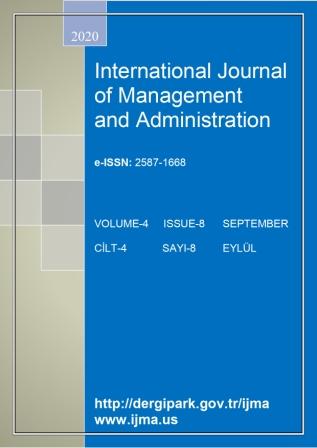ARTIFICIAL INTELLIGENCE ADOPTION AND EMPLOYEE PERFORMANCE IN THE NIGERIAN BANKING INDUSTRY
ARTIFICIAL INTELLIGENCE ADOPTION AND EMPLOYEE PERFORMANCE IN THE NIGERIAN BANKING INDUSTRY
Author(s): Ayobami Folarin Elegunde, Reuben O. OsagieSubject(s): Business Economy / Management, Labor relations, Financial Markets, Accounting - Business Administration, Human Resources in Economy, ICT Information and Communications Technologies
Published by: Dicle Üniversitesi, Sivil Havacılık Yüksekokulu
Keywords: Artificial Intelligence; Complementability; Employee Performance; Ease of Operations;
Summary/Abstract: The study examined Artificial Intelligence and Employee Performance in the Nigerian Banking Industry, Lagos Nigeria as a study to generalize results. The objective of this study was to examine the complementability of AI to work processes and to know if it eases employee operations in banks in Nigeria. Cross-sectional descriptive research design was adopted by the researcher. Primary data was to elicit information for this study. The population of the study was the entire employees of six (6) selected banks operating in Lagos State, Nigeria, which totaled 127 staff. The study adopted Taro Yamane (1967) sample size determinant to arrive at a sample size of 98 elements. 98 copies of questionnaires were administered to respondents of six banks in Lagos State, Nigeria, which was divided using simple proportion and ratio among the six banks, 98 respondents were used for data analysis. Content validity was adopted for this study. Reliability test was conducted using Cronbach Alpha and it returned 0.773 showing internal consistency of research instrument. Descriptive statistics such as mean, simple percentage was used to analyze the demography of respondents while regression and Pearson correlation coefficients were used to analyze data. The findings revealed that Artificial Intelligence complements work process in banks in Nigeria and that machine-aided tasks ease operations in banks in Nigeria. The study recommended the adoption of AI by not only banks but all other firms in the service industry; the need for all employees and people to be educated on the importance of embracing AI; the upgrading of school curriculum at all levels in developing and third world economies to incorporate AI and its accompanying gadgets.
Journal: International Journal of Management and Administration
- Issue Year: 4/2020
- Issue No: 8
- Page Range: 189-205
- Page Count: 17
- Language: English

